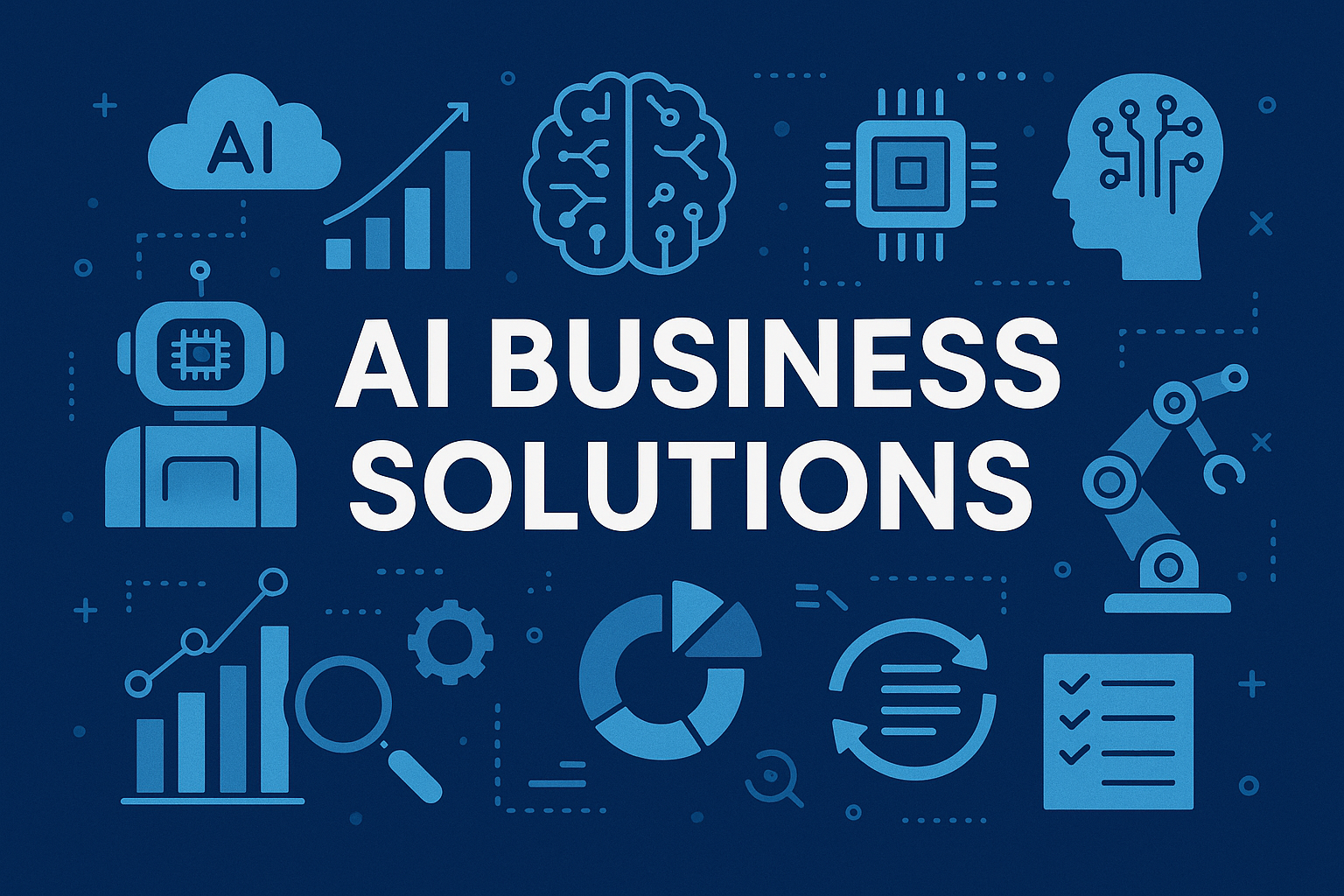Understanding What AI Business Solutions Really Mean
AI business solutions refer to smart systems, tools, and platforms that use artificial intelligence to automate processes, improve decision-making, and unlock insights. It’s not just about robots and sci-fi dreams—it’s about using algorithms to help businesses work faster, smarter, and with fewer errors. Think of it like having a supercharged digital assistant built into your workflow.
In real terms, AI solutions can look like anything from chatbots handling customer inquiries to machine learning models predicting your next hot-selling product. They’re embedded in tools like CRMs, marketing platforms, supply chain systems, and even your favorite analytics dashboards. The best part? These solutions aren’t reserved for giant corporations anymore—small businesses are jumping on the train too.
By integrating AI into your everyday operations, you gain a competitive edge. You stop reacting and start predicting. You eliminate manual guesswork and base decisions on real-time, evolving data. And as the tech becomes more affordable and accessible, the question isn’t “Should I use AI?”—it’s “Why haven’t I started yet?”

The Key Benefits of Implementing AI in Modern Businesses
First off, let’s talk about efficiency. AI helps businesses automate boring, repetitive tasks—freeing up employees to focus on the work that really needs a human brain. Imagine your HR team never having to manually screen hundreds of resumes again. That’s what AI can do—it shortens the grind.
Next, there’s the data advantage. AI thrives on information. It can analyze mountains of data way faster and more accurately than any human. That means businesses get better insights—instantly. From marketing strategies to customer preferences, AI gives you the “why” behind what works and what doesn’t.
And finally, scalability. AI business solutions don’t get tired. They don’t call in sick. Whether you’re a startup or scaling into new markets, AI tools can grow with you—handling more customers, more queries, and more complexity without blinking. That’s game-changing stuff.
How AI Is Reshaping Decision-Making Across Industries
Gone are the days when decisions were made on gut feelings alone. AI empowers data-driven decision-making by offering insights that are predictive, not just reactive. It gives managers the tools to forecast trends, detect anomalies, and simulate outcomes before committing to a move.
In retail, AI helps brands decide what to stock, when to launch products, and how to price them based on buyer behavior. In finance, AI-powered risk assessment and fraud detection keep things tight and accurate. In manufacturing, it can optimize production schedules or alert teams to equipment that’s about to fail.
And the best part? AI doesn’t just throw numbers at you—it visualizes data in meaningful ways. With intuitive dashboards and real-time alerts, decision-makers can act faster and with more confidence. You’re no longer guessing—you’re strategically steering.
AI Automation Tools That Streamline Everyday Business Tasks
Let’s get specific. AI automation tools are popping up everywhere—and they’re surprisingly easy to adopt. Take tools like Zapier with AI-based routing or Notion’s AI-powered document summaries. These platforms allow users to automate repetitive processes like lead routing, email follow-ups, and report generation.
Customer support? Meet AI chatbots. They handle up to 80% of basic inquiries, 24/7, saving your support team hours. Scheduling? Tools like Clockwise use AI to manage calendars and optimize meeting times across teams. Even social media marketing is getting a boost with platforms that auto-generate and A/B test content for you.
These solutions aren’t just nice-to-haves—they’re how modern businesses stay lean and competitive. They reduce errors, save time, and—most importantly—free up your team to focus on creative and strategic thinking.
Machine Learning Use Cases in Finance, Retail, and Healthcare
Machine learning (ML), a powerful subset of AI, is already woven into industries you interact with daily. In finance, ML models analyze historical transaction data to detect fraud within seconds—catching anomalies before they become disasters. Credit scoring, portfolio management, and even robo-advisors are all ML-powered.
In retail, ML helps businesses personalize shopping experiences. Algorithms learn customer preferences and recommend products they’re more likely to buy. It’s the tech behind Amazon’s scary-good suggestions and your favorite clothing site’s “You might also like” section.
Healthcare is where ML is pushing boundaries. It’s being used to predict patient readmissions, identify diseases through imaging, and optimize treatment plans. The systems learn from huge datasets—faster than any human doctor can—which makes them powerful allies in saving time and lives.
The Role of Natural Language Processing in Customer Support
Natural Language Processing (NLP) is that cool cousin in the AI family that makes sense of human language—slang, sarcasm, spelling mistakes, and all. Thanks to NLP, customer service tools can understand and respond to inquiries with more than just canned replies.
Ever chat with a bot that felt oddly human? That’s NLP doing its thing. These systems don’t just recognize keywords—they understand intent. So when a customer types “I need help ASAP,” the AI knows it’s urgent and can route it appropriately.
Beyond support chatbots, NLP powers sentiment analysis tools. These analyze customer reviews, social media posts, and feedback forms to give brands a sense of public opinion in real time. That’s not just useful—it’s critical for brand health and reputation management.
AI for Small Businesses: Affordable Tools That Make a Difference
Here’s the truth: AI isn’t just for big-budget companies anymore. Small businesses now have access to tools that were once exclusive to enterprise giants. Tools like ChatGPT for content creation, Lumen5 for video editing, and Pictory for script-based AI video production are game-changers.
Email marketing? Use platforms like Mailchimp that offer AI-powered subject line suggestions and campaign optimization. Inventory management? Try Zoho Inventory or QuickBooks with built-in AI forecasting features. Bookkeeping? Hello, AI-powered tools like Bench or Pilot.
With cloud-based SaaS platforms, you don’t need to hire a developer or spend six figures. A monthly subscription gets you access to smart, scalable tools that punch way above their weight class. That’s how small businesses win big.
The Risks and Ethical Considerations in Adopting AI
Not everything is sunshine and neural networks. With great power comes great responsibility. AI raises serious ethical concerns—data privacy, algorithmic bias, transparency, and job displacement are just a few.
Biased algorithms can reinforce inequality, especially if they’re trained on skewed data. Think hiring tools that unintentionally screen out women or minorities. That’s not just unfair—it’s a liability. Businesses must audit and monitor their AI systems to ensure ethical outcomes.
Then there’s the data. AI thrives on data, but who owns it? How is it stored? Who can access it? Without strict compliance (like GDPR or CCPA), your AI dreams could turn into legal nightmares. Adopt AI responsibly, and always think ahead—your brand’s trust depends on it.
Case Studies: Real Companies Thriving with AI Business Solutions
Let’s take a look at real-world wins. Sephora, the cosmetics giant, uses AI to personalize customer recommendations both online and in-store. Their chatbot “Sephora Virtual Artist” uses computer vision and AI to suggest products based on selfies.
In logistics, UPS uses AI to optimize delivery routes. Their ORION system reportedly saves 100 million miles driven per year—translating into millions of dollars in fuel savings. That’s not just efficient; it’s next-level smart.
Even in agriculture, companies like John Deere are rolling out AI-enabled tractors that can plant, water, and monitor crops using computer vision and deep learning. The result? Less waste, better yields, and smarter farming. These companies prove that AI isn’t just for tech firms—it’s for every industry willing to evolve.
How to Start Integrating AI Into Your Business Today
You don’t need to hire a team of data scientists to get started. The best first step? Identify your biggest time sucks. What’s repetitive, slow, or prone to human error? That’s likely a prime candidate for automation with AI.
Start small. Implement AI in marketing tools, customer support, or internal data analysis. Platforms like HubSpot, Salesforce, and Google Analytics have AI capabilities baked in. Use them. Learn from them. Then expand from there.
And don’t forget the human side. Train your team. Keep communication open. AI isn’t about replacing humans—it’s about helping them work smarter. Once you see the ROI, you’ll wonder why you didn’t jump on the AI train sooner.
Conclusion
AI business solutions aren’t a luxury anymore—they’re a necessity. From smarter decisions and faster workflows to personalized customer experiences and industry-specific breakthroughs, AI is transforming the way we work and grow. If your business isn’t exploring AI yet, you’re leaving opportunity (and efficiency) on the table.
Now’s the time to explore the tools, take small steps, and build an intelligent foundation for the future. Ready to transform how your business operates? Drop a comment, share your thoughts, or subscribe to get more real talk on AI trends. Let’s keep this conversation going—because the future of business is already here.


